Do smart beds with built-in TVs ruin your sleep? Here's what the new science tells us
New study warns devices should be kept out of bed – but what does this mean for TV smart beds?
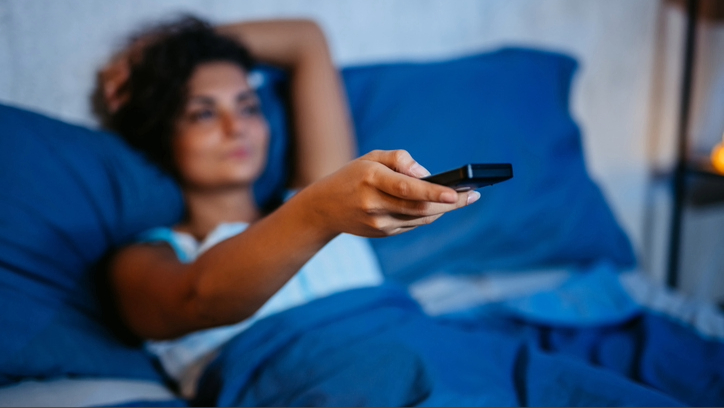
Smart beds with built-in TVs have become popular among our tech-obsessed society. They can free up space and provide discreet storage for television devices, while still providing a luxuriously comfortable and supportive feel.
While our top picks for this year's best mattresses for all sleepers focuses on support and comfort, Smart Beds with built-in TVs offer luxury alongside an immersive surround sound experience, catering to lifestyles where relaxation and media consumption go hand in hand.
But, in terms of sleep health, TV smart beds have a dark side. Inevitably, they encourage screentime in bed and studies have shown this can decrease the quality of sleep we get. Here we’ll look at how smart beds with integrated TVs can impact your sleep, why you should (or shouldn’t) avoid screens before bed and how you can perfect your bedtime routine.
What is a TV smart bed?
Smart beds are primarily used for sleep quality tracking, ultimate comfort and convenience. Their features include adjustable firmness, temperature control and regulation, heart rate monitoring and sleep cycle tracking.
They are customizable, produce personalized sleep reports and offer advice on improving sleep quality, which is accessible through compatible mobile apps. Some smart beds are programmed with AI, others are operated via a remote control.
TV beds are a type of smart bed that integrate a television within their structure. They are typically designed with a footboard that houses a retractable television, which can be revealed or hidden via a motorized mechanism or manual lift.
There is no denying TV smart beds are an innovative type of furniture. They are especially advantageous for city dwellers living in small apartments with limited space. Experts often explain how a decluttered bedroom can help you fall asleep faster, after all.
Sign up to get the BEST of Tom's Guide direct to your inbox.
Get instant access to breaking news, the hottest reviews, great deals and helpful tips.
How can TV before bed ruin your sleep?
Debate around the impact of watching TV before bed on sleep quality is still ongoing, with different pools of research showing different results.
Some studies say blue light isn’t as bad for your sleep as you think, only delaying your sleep by 2.7 minutes. Other experts warn against screen use one to two hours before bed, saying the blue light emitted from screens can interfere with melatonin production, which makes it harder to fall into a deep, restorative sleep. Reduced sleep quality can cause exhaustion and impaired cognitive function the next day.
Current sleep guidelines recommend no screen time in the hour or two leading up to bedtime. However, new research by experts at the University of Otago suggests it is not so much about timing but more about where you use these digital devices before trying to sleep. This study is titled ‘Keep devices out of bed for better sleep’, but when your TV is literally attached to your bed, it’s pretty hard to do that.
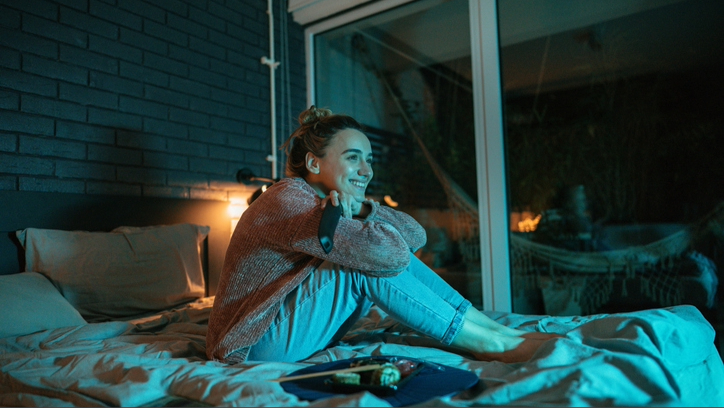
The new research shows using devices while in bed, eating into time that you planned to be sleeping, is the main problem. Published in JAMA Pediatrics, the study had 85 adolescents aged 11 to 14 years wear a body camera on their chest from three hours before bed until they got into bed, over the course of one week.
The researchers found 99% of participants used screens in the two hours before bed, more than half used screens once in bed, and a third used them after first trying to go to sleep for the night.
The study’s lead author, Dr Bradley Brosnan of the Edgar Diabetes and Obesity Research Centre, says: "Our most interesting findings were that this screen time before they got into bed had little impact on sleep that night. However, screen time once in bed did impair their sleep – it stopped them from going to sleep for about half an hour, and reduced the amount of sleep they got that night."
Dr. Chelsea Perry, owner of Sleep Solutions and a member of the American Academy of Sleep Medicine, also advocates that devices should be kept away from your sleep space. She says: “Your bedroom should only be for sleeping.” So, sorry TV beds, the experts don’t approve.
Is watching TV while you fall asleep bad?
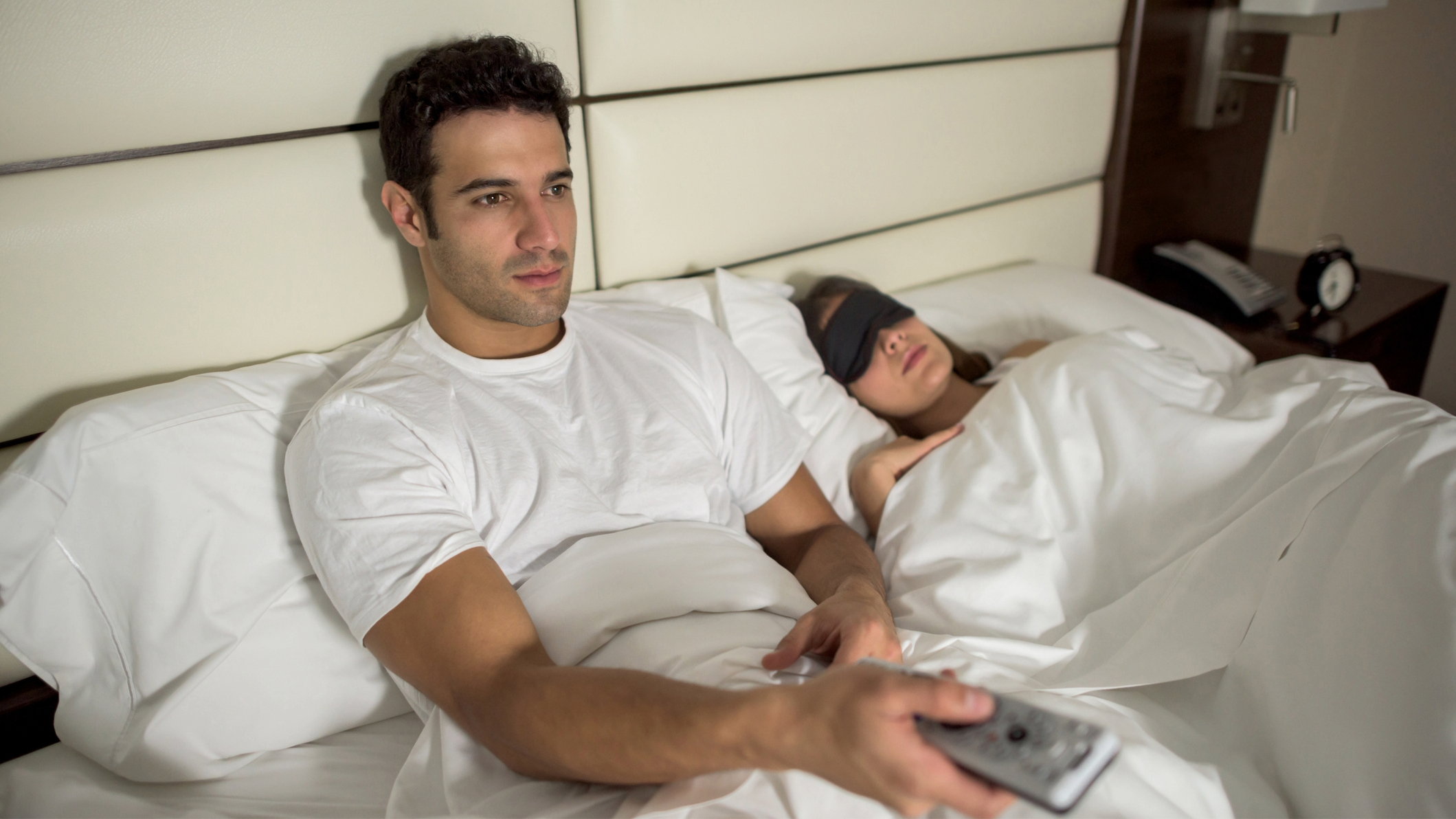
There are many reasons people watch TV while falling asleep. To some it provides relaxation and distraction, allowing them to disconnect from daily stressors and worries that might otherwise keep them awake at night.
Others use it to end the day in a fun, entertaining way. To make matters even more contradictory, if watching TV is part of your personalized nightly routine, it might signal to your body that it’s time to wind down.
That said, the science and experts generally agree we shouldn’t be watching TV as we doze off. Dr Perry says: “Watching TV while falling asleep can mess with your ability to get good rest because the light and stimulation from the screen can trick your brain into staying alert.”
Why should we avoid all screens before bed?
Blue light at bedtime has long been demonized, and there's a good reason for it. It seems like common sense that a glaring screen light can prevent you from falling asleep. Especially considering a lot of sleep science talks about how light disrupts sleep, restricts the production of the sleep-hormone melatonin and signals our body to wake up.
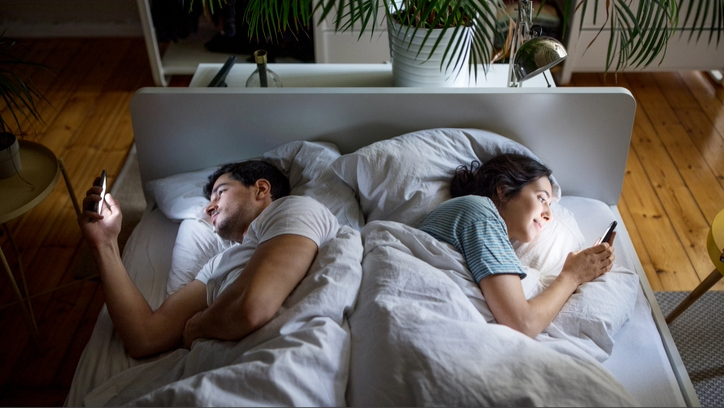
Dr Brosnan’s study found interactive screen activities, like gaming and multitasking, when more than one device is used at the same time (I’m sure we’re all guilty of scrolling while the TV plays in the background), particularly hindered sleep. He says: "Every additional 10 minutes of this type of screen time reduced the amount of sleep they got that night by almost the same amount.”
Essentially, it is not the blue light that keeps us awake, but our addictive tendencies to keep scrolling and watching when we should be sleeping.
Are TV smart beds a good idea?
Deciding whether a smart bed with a built-in TV is right for you will depend on several factors. Ask yourself: How big is your bedroom? What are your personal sleep cues? Do you have the willpower to turn it off when it’s time to sleep?
But the experts give a word of warning. Dr Perry explains: “Smart beds with built-in TVs might sound convenient, but they’re probably not the best idea if you’re aiming for quality sleep. Having that temptation right there can make it too easy to stay up late, glued to whatever you’re watching, instead of getting the rest you need.”
3 Bedtime routine tips for quality sleep
1. Leave devices outside of the bedroom
As suggested in Dr Brosnan’s study, keeping devices away from your bed is essential for quality sleep. Being disciplined with yourself and turning off devices before you enter your sleep space will help you get the restorative sleep your body needs to perform at its best.
With mobiles, tablets, gaming consoles and TVs away from your bed, you’ll be less tempted to go on them while trying to drift off. Even better, you won’t be kept awake or disturbed by notification alerts. Do not disturb mode should be your new best friend.
But what about an alarm? Try investing in a good old fashioned alarm clock so you don’t rely on your mobile being close to you during the night.
2. Read a book or listen to music
It’s true, bedtime stories never get old. In place of a TV screen, try reading before bed. The 2021 Reading Trial by the National Library of Medicine proved reading a book in bed before going to sleep improved sleep quality, compared to not reading a book in bed.
This is because reading helps promote calmness by distracting your mind from the stresses of the day. It has also shown to slow heart rate and release tension in the muscles, helping the body to relax.
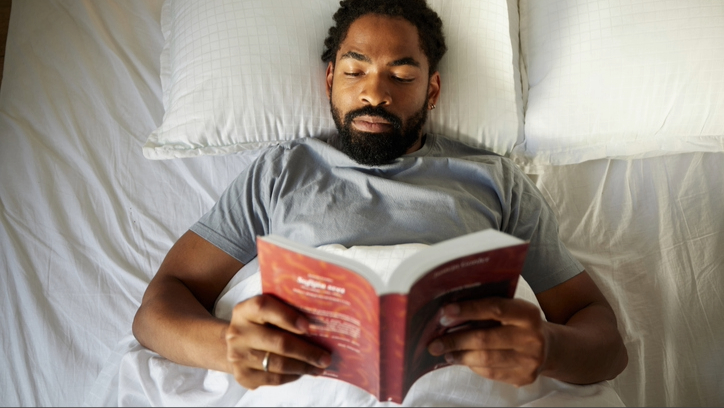
Similarly, listening to music can help you wind down. Studies indicate music can have a soothing, sleep-inducing effect, so it is worth considering incorporating it into your bed routine. Have a look online for sleep playlists, or curate your own selection of relaxing songs (but steer clear of any that elicit a strong emotional response).
3. Keep it consistent
We’ve said it plenty of times before, and we won’t stop saying it. Routine is the bedrock of quality sleep. Sleeping at roughly the same time each night helps your body establish a healthy, efficient circadian rhythm.
Additionally, a nighttime routine will help you fall asleep faster. Through practicing a routine, you train your mind and body to listen to sleep cues so it knows when it is time to switch off.

Eve is a PPA-accredited journalist with an MA in Magazine Journalism from Cardiff University. She is a Sleep Staff Writer at Tom’s Guide and has four years’ experience writing health features and news. She is particularly interested in the relationship between good sleep and overall health. At Tom’s Guide Eve is responsible for coverage and reviews of sleep tech and is our smart and cooling mattress specialist, focussing on brands such as Eight Sleep and Sleep Number. She also covers general mattress reviews, seeks out the best deals to produce tried-and-tested buyer's guides for sleep accessories and enjoys writing in-depth features about sleep health. She has been involved in rigorous testing procedures for mattress reviews in our Sleep Studio and has interviewed experts including sleep doctors and psychologists. When not covering sleep at Tom's Guide, Eve enjoys writing about health and fitness, food and culture.
